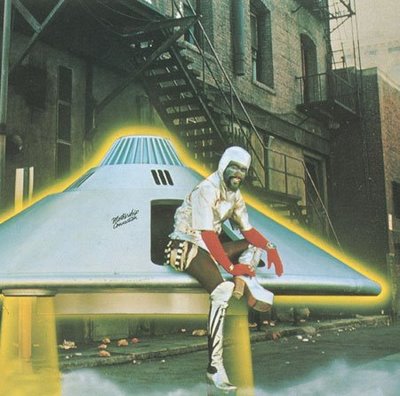The history of black people has been a history of movement—real and imagined. Who can hear “Swing Low, Sweet Chariot” or Parliament’s “The Mothership Connection” and not hear these travel/escape narratives—afrofuturistic representations of freedom?
While the term Afro-futurism can be formally traced back to the publication of Mark Dery’s 1994 edited collection Flame Wars:The Discourse of Cyberculture, its message is not limited to the 90’s. As a larger and broader aesthetic, black people have long articulated black futures and freedom dreams in the midst of black experiences as a mode of survival.
Black music, whether that has been the Negro spirituals, funk, or hip hop, has long articulated the need for African Americans to envision freedom as a travel narrative. However, African American literature while much later than some of the spirituals has also contributed a verse to expand and contribute to the dialogue of Afrofuturism as liberation.
Parliament explains in their 1975 classic Mothership Connection that the Mothership ‘aint nothing but a party,’ and then later compares it to “Swing Low, Sweet Chariot”, which seems to suggest that the Mothership is also a means of salvation. George Clinton, later explaining the album said they wanted to put “brothers in outer space, in places people wouldn’t normally associate them.” Clinton’s explanation joins the long line of African American utterances and articulations of new possibilities in the hopes of liberation in this world or another.
 Meanwhile, the unnamed protagonist in Ralph Ellison’s Invisible Man is hiding out underground in New York City at the onset of the novel stealing electricity to power his turntables. The Invisible Man creates a space outside of time where he indeed can begin to imagine and construct new relations between the past and present as well as art and technology. By doing so, he creates a new black future.
Meanwhile, the unnamed protagonist in Ralph Ellison’s Invisible Man is hiding out underground in New York City at the onset of the novel stealing electricity to power his turntables. The Invisible Man creates a space outside of time where he indeed can begin to imagine and construct new relations between the past and present as well as art and technology. By doing so, he creates a new black future.
These musical and literary renderings of black self-determination illustrate the varied experiences and ways in which blacks have envisioned new possibilities for existence given the often harsh circumstances under which they have lived. Blacks have indeed been influential in their struggles for freedom by proposing and envisioning new ways of living and being in the world.

